Key takeaways:
- Food journaling enhances awareness and reflection by documenting not only what you eat but also how it affects your emotions and energy levels.
- Benefits include identifying emotional triggers for eating, accountability for food choices, and improved nutrition through mindful meal planning.
- Common challenges include consistency in logging meals, confronting emotions tied to eating, and overcoming the pressure to maintain perfection in entries.
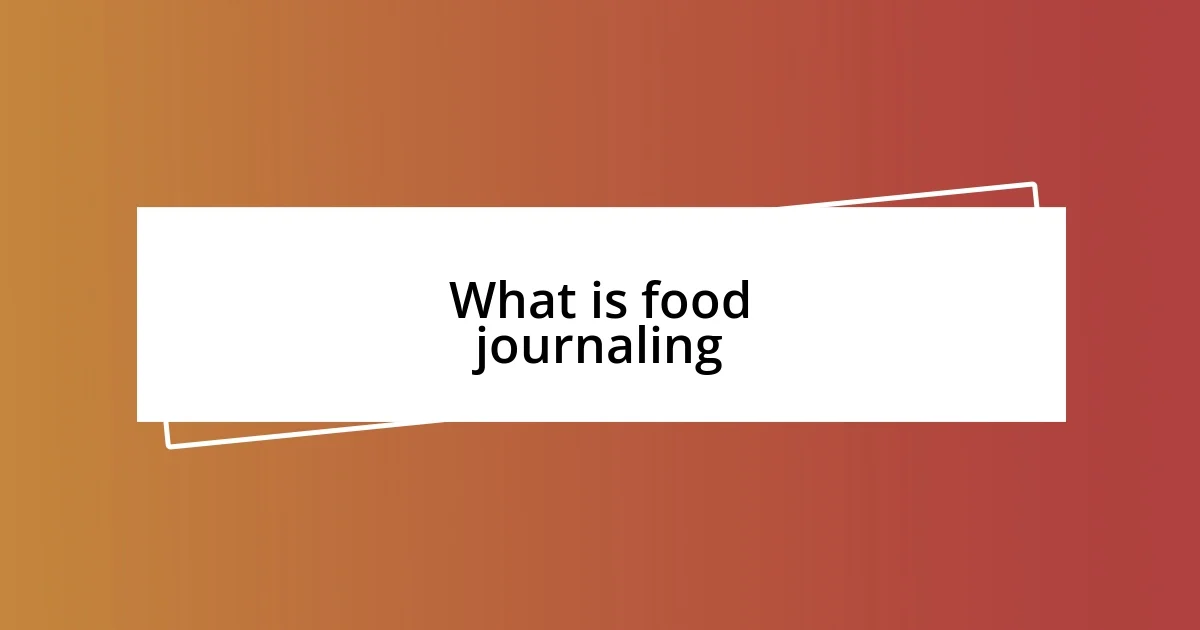
What is food journaling
Food journaling is the practice of writing down everything you eat and drink throughout the day. It might sound simple, but I remember when I first started, it felt like uncovering a treasure chest of insights about my eating habits. Have you ever realized how a seemingly innocuous snack can slip into your routine without you even noticing? That’s the kind of revelation food journaling can bring.
By documenting my meals, I noticed not just what I was eating but also how it made me feel. For instance, I’d jot down that I indulged in a sugary pastry. At first, it was just a tasty treat, but soon I connected it to an afternoon energy crash. Has this ever happened to you? Recognizing these patterns is both eye-opening and empowering.
What sets food journaling apart is its ability to spark self-reflection. It’s not just about calories or macros; it’s a way to connect emotions with food choices. One day stands out—I wrote down my dinner was a bowl of comforting pasta after a stressful workday. I felt a sense of comfort it brought me, but later realized I could find healthier coping mechanisms. Could a food journal be the mirror you didn’t know you needed?
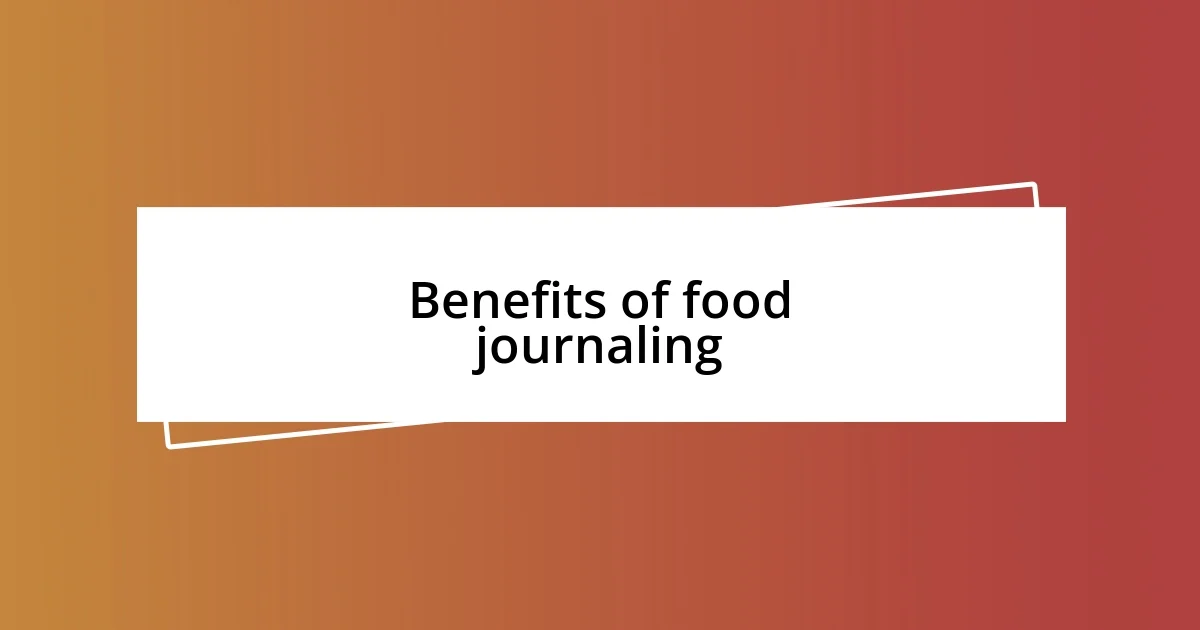
Benefits of food journaling
The benefits of food journaling extend far beyond simple record-keeping. Personally, I found that tracking my meals helped me become more mindful about what I consumed. I recall one week when I noticed a correlation between my snacking and my mood swings. By writing it all down, I felt empowered to make healthier choices and even started planning my meals around my emotions, which transformed my relationship with food.
Here are some specific benefits I discovered through my food journaling journey:
- Increased Awareness: I became more conscious of my eating habits, noticing patterns I previously overlooked.
- Identifying Triggers: It helped me pinpoint emotional eating triggers, leading to healthier coping mechanisms.
- Accountability: Seeing everything I ate written out made me more accountable for my choices.
- Improved Nutrition: I started incorporating more balanced meals, as I wanted to write down colorful, nutrient-rich options.
- Enhanced Motivation: Tracking progress, like improving my energy levels or losing weight, fueled my motivation to stick with my goals.
It’s fascinating how a simple act of writing can lead to such profound insights about our eating habits.
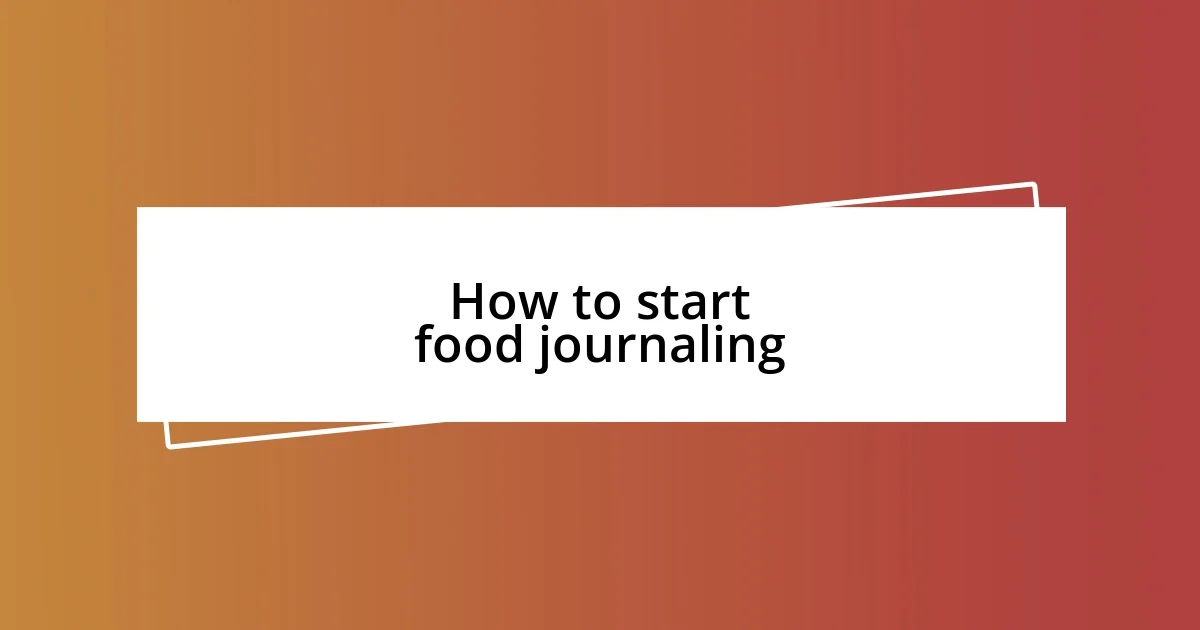
How to start food journaling
To start food journaling, I recommend finding a method that feels right for you. Personally, I prefer using a simple notebook. There’s something satisfying about physically writing down my meals. Alternatively, you could use a food journaling app for a more tech-savvy approach. What works best for you might depend on your lifestyle.
When beginning your food journal, focus on consistency. I initially aimed to log my meals daily, but it took time to establish that routine. At first, I even missed days! But over time, I found that setting aside a few minutes after each meal helped cement the habit. Consider setting a reminder or making it part of your daily routine, like brushing your teeth.
Lastly, be honest with yourself. My food journal only became truly insightful when I allowed myself to document everything, even those late-night snacks I’d like to forget. This genuine reflection is what led me to understand my habits better, like recognizing when I ate out of boredom rather than hunger. Have you ever thought about how much those little bites add up?
| Method | Description |
|---|---|
| Notebook | A simple, tangible way to jot down meals and feelings. |
| Food Journaling App | A tech-savvy method for logging meals with additional tracking features. |
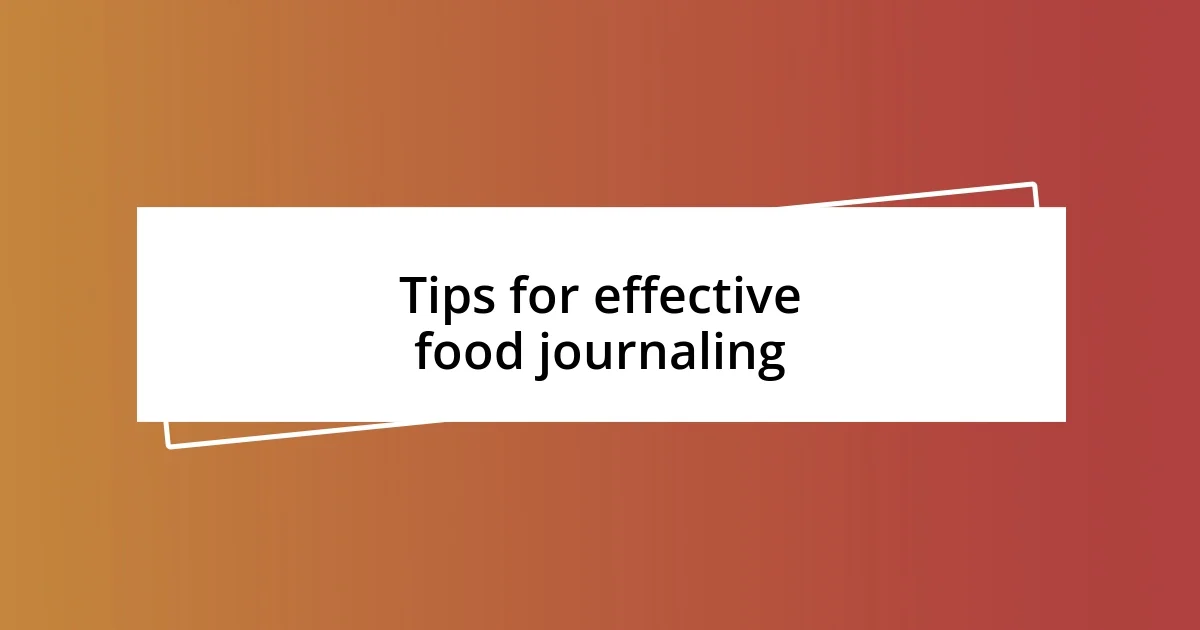
Tips for effective food journaling
When it comes to effective food journaling, one of the most impactful tips I can share is to include not just what you ate, but also how you felt at the time. I remember a day when I felt unusually fatigued, and as I wrote down my meals, I noticed a pattern emerging. It turned out that my energy levels plummeted on days when I didn’t prioritize breakfast. Recognizing this connection helped me establish the habit of starting my day with a nutritious meal, transforming my mornings.
Another important aspect is to set specific goals for your journaling experience. Whether you want to reduce sugar intake or explore new cuisines, having a clear purpose makes the process more engaging. I once set a challenge for myself to incorporate at least one new healthy recipe each week. By jotting this down alongside my daily meals, I felt excited to try different flavors and, at the same time, enhance my nutrition. Isn’t it amazing how simple goals can motivate us to expand our culinary horizons?
Lastly, don’t hesitate to reflect on your food journal regularly. I make it a point to revisit my entries every few weeks, and the insights I gain are often eye-opening. For instance, I realized that weekends were a time when I indulged more freely, which shed light on what I could do to stay balanced. How often do we really take a step back to analyze our choices and their impact on our overall well-being? Engaging with your journal not only deepens your understanding of your eating habits but also fosters a sense of connection with your journey towards healthier living.
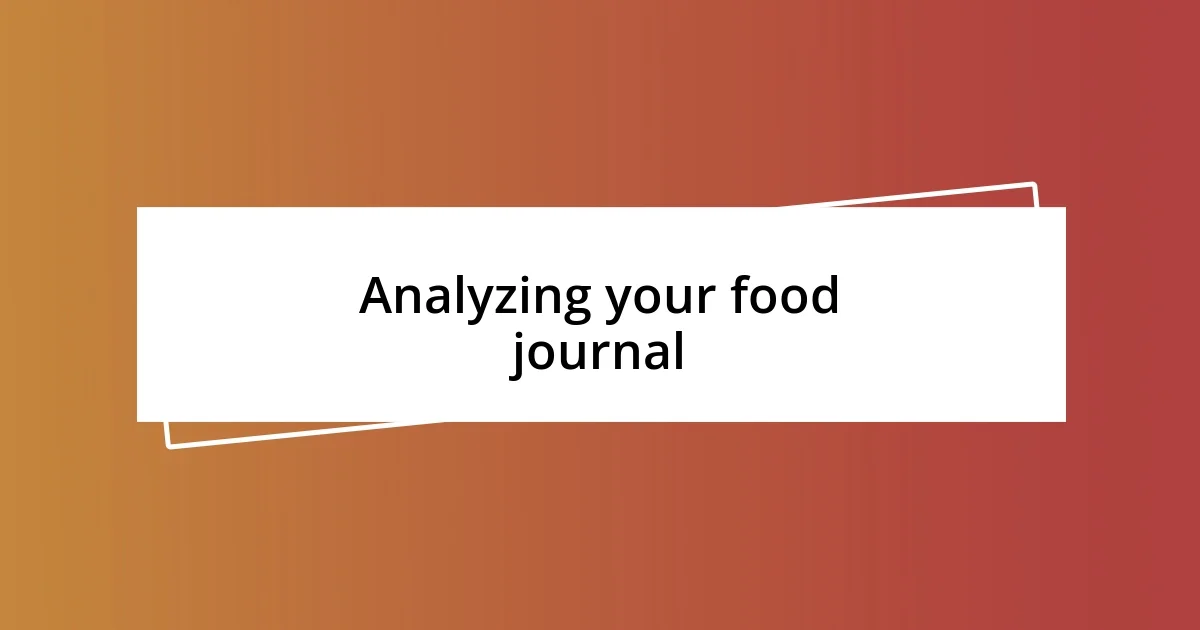
Analyzing your food journal
When I first sat down to analyze my food journal, I was surprised by what I discovered. Certain foods consistently triggered my cravings, reminding me of a childhood memory when I’d sneak a cookie after school. By highlighting these patterns, I realized that my emotional connection to food went deeper than I thought. This awareness helped me approach those cravings not just as an urge, but as a signal to reflect on my emotions.
As I continued this journey, I noticed that my energy levels fluctuated depending on my meal choices. I remember a week where I ate mostly takeaway; fatigue set in like a heavy blanket. Revisiting my journal, I could pinpoint the exact meals that drained my energy. Have you ever felt like your food choices were contributing to your tiredness? This introspection pushed me to prioritize vibrant, home-cooked meals, leading to a noticeable boost in my overall mood and vitality.
It’s fascinating how analyzing our habits often reveals subtler truths. While reviewing my entries, I found myself revisiting moments of guilt after indulging in a dessert. What I learned was empowering: allowing myself those treats without judgment made it easier to enjoy them mindfully. Reflecting on this experience, I can say that truly analyzing my food journal has given me not just data, but clarity. It’s a process that encourages you to be kinder to yourself, and that is a lesson we can all benefit from.
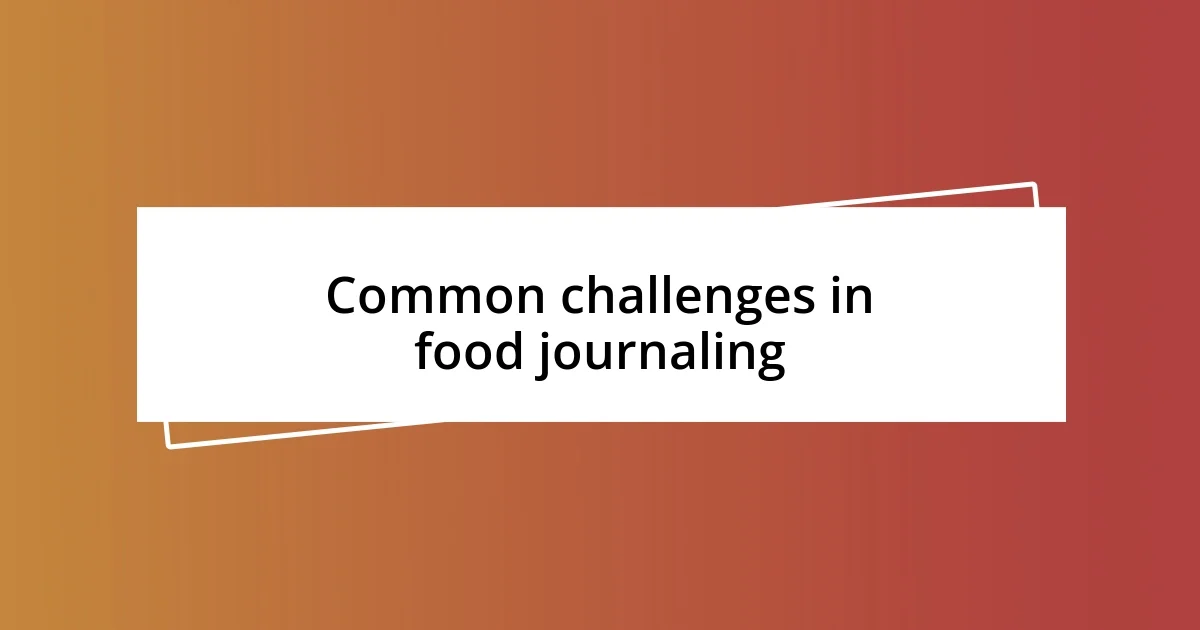
Common challenges in food journaling
Food journaling sounds straightforward, but I’ve encountered my fair share of hurdles along the way. One of the biggest challenges I faced was remembering to log my meals consistently. There were days when I would get caught up in a busy routine, and by nightfall, I’d realize I had forgotten to write anything down. Do you ever feel overwhelmed by life’s demands? I had to find strategies, like setting reminders on my phone, to help me stay accountable. It made all the difference in ensuring I recorded my thoughts and feelings about food.
Another struggle was confronting my feelings on the page. Initially, I found it uncomfortable to write about my emotions related to eating. I remember feeling a mix of guilt and shame after a particularly indulgent meal—like I had failed myself. But I discovered that being honest in my journal about my emotions led to deeper insights. Have you ever felt a sense of release when you finally express something that’s been weighing on you? It’s liberating to acknowledge those feelings, and I learned that they play a crucial role in my relationship with food.
One challenge that caught me off guard was the tendency to overthink my entries. I would ruminate over every detail, worrying about getting it “just right.” At times, I would hesitate to write down a meal because I was concerned about judgment—both from myself and others. Have you ever felt pressure to present your food choices perfectly? I had to remind myself that the journal is a personal space for growth, not a performance. Letting go of that pressure allowed me to enjoy the process, and now I approach each entry with curiosity rather than perfectionism.














